Faculty of Arts,
Chulalongkorn University
"My
Pretty Rose Tree"
(1794)
William Blake
(November
28, 1757
– August 12, 1827)
|
Copy
A, Plate 33
|
A flower was
offered to me;
Such a flower as May never bore
But I said I've a Pretty Rose-tree:
And I passed the sweet flower o'er.
Then I went to my Pretty rose-tree;
To tend her by day and by night.
But my Rose turnd away with jealousy:
And her thorns were my only delight. |
1
2
3
4
5
6
7
8
|
"My Pretty Rose Tree" Notes
This poem is in the Songs of
Experience section of Songs of
Innocence and of Experience: Shewing the Two Contrary States of the
Human Soul (1789).
4 passed...o'er:
passed over
- pass over (Oxford
Dictionary)
phrasal verb
1 (pass someone over, pass over someone) Ignore the claims of
someone to promotion or advancement.
1.1 (pass something over, pass over something) Avoid mentioning
or considering something.
7 jealousy:
- jealous (Oxford
Dictionary)
adjective
1 Feeling or showing an envious resentment of someone or their
achievements, possessions, or perceived advantages.
‘she was always jealous of me’
1.1 Feeling or showing a resentful suspicion that one's partner
is attracted to or involved with someone else.
‘a jealous husband’
1.2 Fiercely protective of one's rights or possessions.
‘the men were proud of their achievements and jealous of their
independence’
1.3 (of God) demanding faithfulness and exclusive worship.
‘In Hebrews we also meet the strong protests of the jealous God,
who is intolerant of rivals with a holy intolerance.’
8 delight:
- delight (Oxford
Dictionary)
1 Great pleasure.
‘the little girls squealed with delight’
1.1 (count noun) A cause or source of great pleasure.
‘the trees here are a delight’
- delight (Etymology
Online)
c. 1200, delit, "high degree of pleasure or satisfaction," also
"that which gives great pleasure," from Old French delit "pleasure,
delight, sexual desire," from delitier "please greatly, charm,"
from Latin delectare "to allure, delight, charm, please,"
frequentative of delicere "entice" (see delicious). Spelled delite
until 16c.; the modern unetymological form is by influence of light,
flight, etc.
Prose
Paraphrase
| Blake's
Poem |
Prose
Paraphrase |
Some
Interpretation |
Comments
|
|
A flower was offered to me;
Such a flower as May never bore
|
A flower was offered to me. The month of May has
never produced a flower like this.
|
A flower was offered to me. A beautiful flower like
this the month of May, the height of spring, has never
created.
|
How important is the inversion in the original? Does
May replacing the flower affect the focus of the lines?
What kind of flower is this that does not bloom naturally in
spring?
|
But I said I've a Pretty Rose-tree:
And I passed the sweet flower o'er.
|
But I said that I have a pretty rose tree, and I did
not accept the sweet flower.
|
But I said that I have a pretty rose tree, and I did
not consider taking the sweet flower.
|
How important is the conjunction "and"? How does
reading it as "so" alter Blake's text?
|
Then I went to my Pretty Rose-tree;
To tend her by day and by night.
|
Then I went to my pretty rose tree to tend her during
the day and at night. |
Then I went back to my pretty rose tree to take care
of her day and night. |
How significant is the possessive?
How significant is the gendered pronoun?
|
But my Rose turnd away with jealousy:
And her thorns were my only delight.
|
But my rose turned away with jealousy and her thorns
were my only enjoyment.
|
But my rose, out of jealousy, did not bloom and I can
only enjoy her thorns.
|
How important is the transition from "Rose-tree" to
"Rose" in these last lines?
What resonance does the possessive "my" have at the end? What
sense does each "my" have? Are they the same?
|
The Songs of Innocence
are indeed "of" and not "about" the state of innocence. There is much
critical debate about Blake's Innocence,
and little that is definitive can be said about it. The reader should know
that the root meaning of innocence is "harmlessness," the derived meanings
"guiltlessness" and "freedom from sin." But Blake uses the word to mean
"inexperience" as well, which is a very different matter. As the contrary of
Experience, Innocence cannot be reconciled with it within the context of
natural existence. Implicit in the contrast between the two states is a
distinction Blake made between "unorganized innocence," unable to sustain
experience, and an organized kind which could. On the manuscript of The
Four Zoas, he jotted down: "Unorganized
Innocence: An Impossibility. Innocence dwells with Wisdom, but
never with Ignorance."
Since Innocence and Experience are states of the soul
through which we pass, neither is a finality, both are necessary, and
neither is wholly preferable to the other. Not only are they satires upon
one another, but they exist in cyclic relation as well. Blake does not
intend us to see Innocence as belonging to childhood and Experience to
adulthood, which would be not only untrue but also uninteresting. [...]
Innocence satirizes Experience just as intensely as it itself is satirized
by Experience, and also...any song of either state is also a kind of satire
upon itself.
--Harold Bloom and Lionel Trilling, "Songs
of Innocence and of Experience," Romantic
Poetry and Prose (New York: OUP, 1973): 17–18.
"Read patiently take not up this Book in an idle hour the consideration of
these things is the whole duty of man & the affairs of life & death
trifles sports of time these considerations business of Eternity." Blake's
annotations to a volume he studied in 1798 (see Blake, ed. Erdman
[E] 611) can serve today to characterize the attention deserved and
significance offered by the most familiar work of England's "last great
religious poet" (Ackroyd 18) and "greatest revolutionary artist" (Eagleton,
in Larrissy ix).
[...]
"Language is the house of Being,"
according to Heidegger's famous figure (see Steiner 127) but for Blake, as
for Wordsworth, that structure becomes for most a prison-house maintained
by "pre-established codes," by cliché and convention. The warden of the
prison-house, the fashioner of "mind-forgd manacles," the force that has
barred us from the play of Being in language, as from the stunning energy
of true poetry, can be seen as "the bard." The fallacy in crediting such
assumed authority looms in the "Introduction" to Songs
of Experience, where, by the eighth line, three distinct subjects
"might controll / The starry pole." With its echoes of Jeremiah ("O earth,
earth, earth, hear the word of the Lord") and the God of Paradise
Lost ("past, present, future he beholds"), the bard seems to
command reverence—but as in other cases, on inspection, the compelling
language breaks into mumbo jumbo, etched on a plate whose vista of stars
is graphically barred by the cloud of words. Students of the Bible, and of
Wesley's great hymn, "Wrestling Jacob," will recognize that it is the
opportunity to struggle for blessing or interpretation from a sacred
messenger that is given "till the break of day." The religious references
resonate with the particularly eighteenth-century, evangelical sense of
"experience" as the inner history of one's religious emotion (see OED,
s.v., 4b)—indeed, "hymn of experience" appears throughout accounts of
Methodism.
--Nelson
Hilton, "William
Blake, Songs of Innocence and of Experience," The
Blackwell Companion to Romanticism, ed. Duncan Wu (Oxford:
Blackwell, 1998)
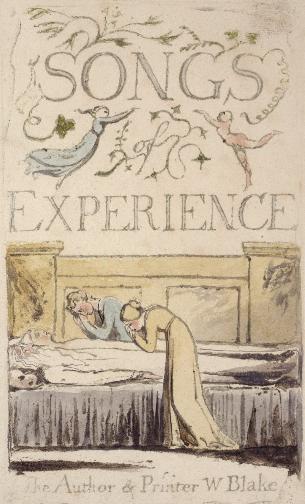
|
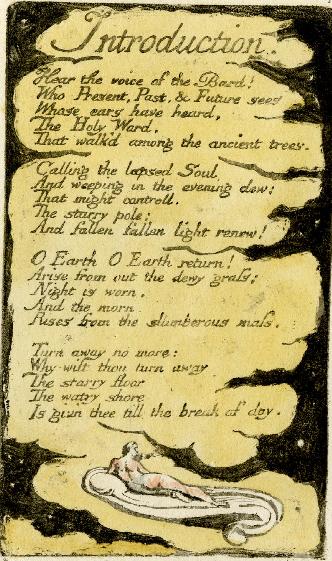
|
"Introduction," Songs
of Experience (1789)
Hear the voice of the Bard!
Who Present, Past, & Future sees
Whose ears have heard,
The Holy Word,
That walk'd among the ancient trees.
Calling the lapsed Soul
And weeping in the evening dew:
That might controll,
The starry pole;
And fallen fallen light renew!
O Earth O Earth return!
Arise from out the dewy grass;
Night is worn,
And the morn
Rises from the slumberous mass.
Turn away no more:
Why wilt thou turn away
The starry floor
The watry shore
Is giv'n thee till the break of day.
|
1
2
3
4
5
6
7
8
9
10
11
12
13
14
15
16
17
18
19
20 |
This persona is not Blake.
cf. Genesis
3:8
cf. Jeremiah
22:29
|
|
Study Questions
- How
many characters do you see in the poem?
- What
difference does Blake make between a flower and a tree?
- What
difference does Blake show between the flower and the
rose?
- What
distinction does Blake make between "sweet" and
"pretty"?
- Consider
the two-stanza structure of the poem. Is this reflected
in the illumination? Why or why not?
- What
connection is there between the possessive diction and
the word jealousy?
- How
do the two buts connect and/or contrast the last
two lines of each stanza?
- What
value assumption is the speaker making when he/she
refuses the gift of the flower and how does his
disrupted assumption at the end change that value
concept?
|
Sample Student
Responses to William Blake's "My Pretty Rose Tree"
Response 1:
Study Question:
|
|
Student Name
2202234
Introduction to the Study of English Literature
Acharn Puckpan
Tipayamontri
June 12, 2013
Reading
Response 1
Title
Text.
|
|
Plates
|
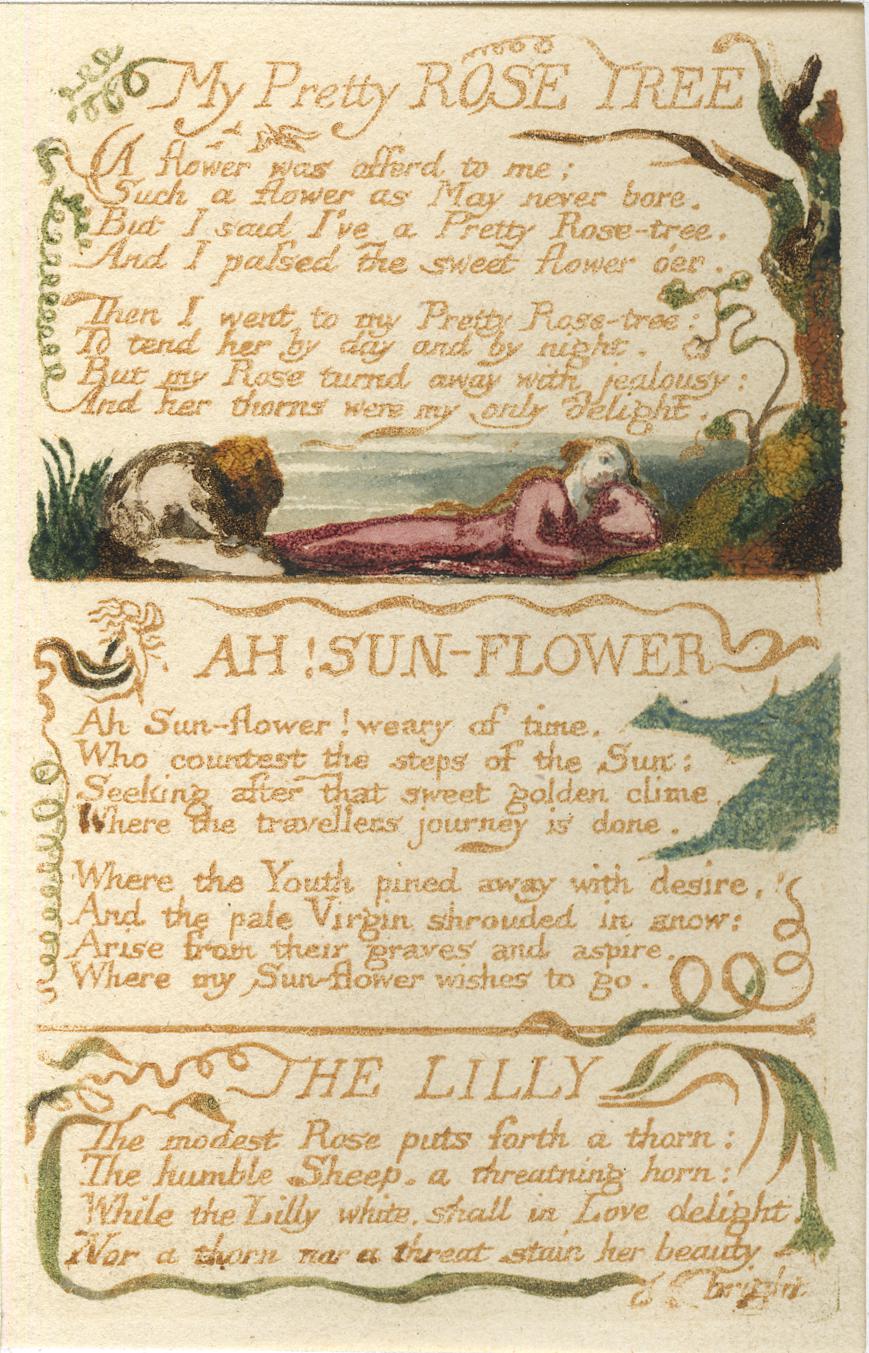
|
- Blake, William. "My Pretty Rose Tree." 1794. Songs
of Experience. Plate 43. Copy T. The British
Museum.
|
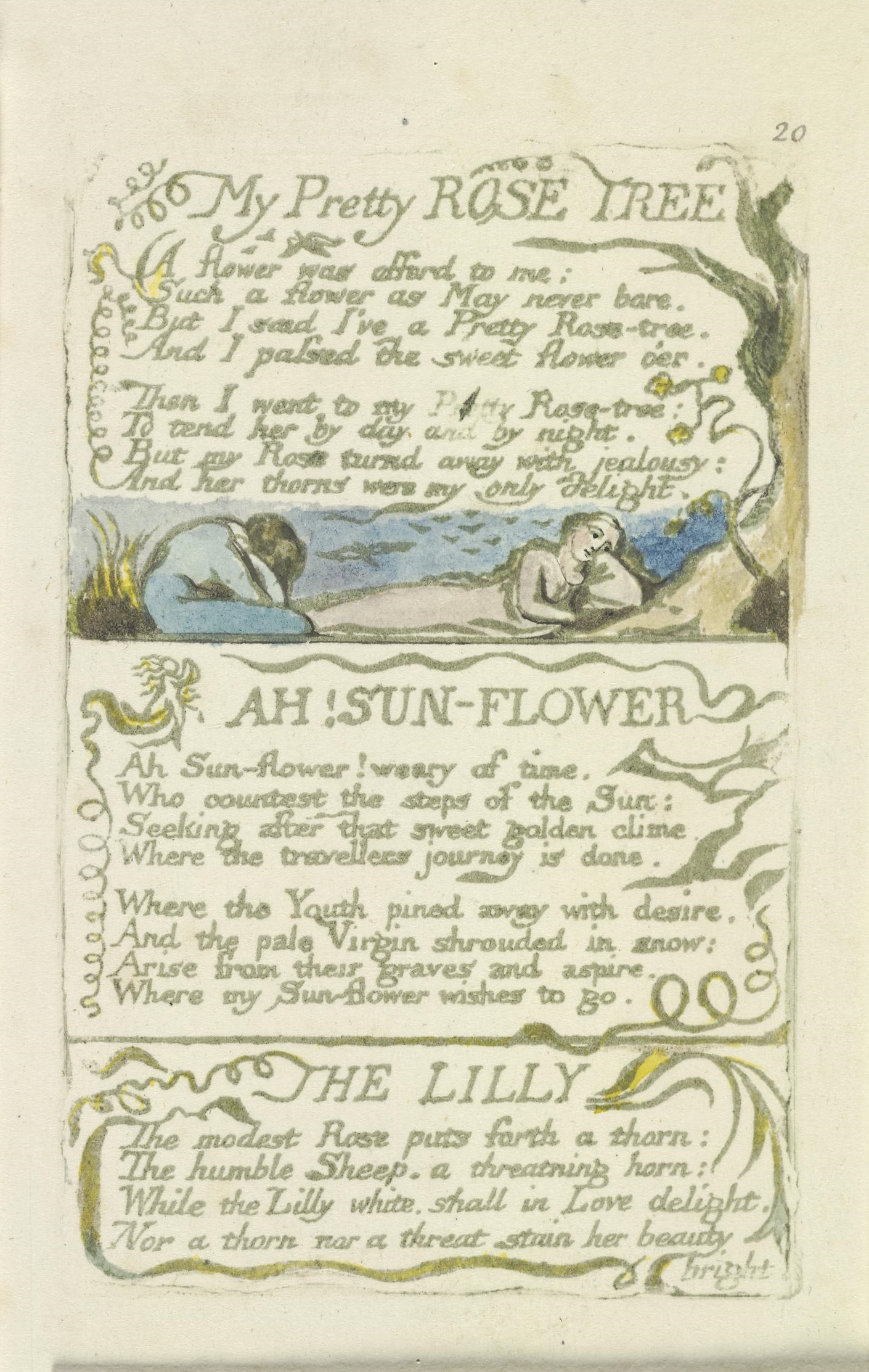
|
- Blake, William. "My Pretty Rose Tree." 1794. Songs
of Experience. Plate 50. Copy A. The British
Museum.
|
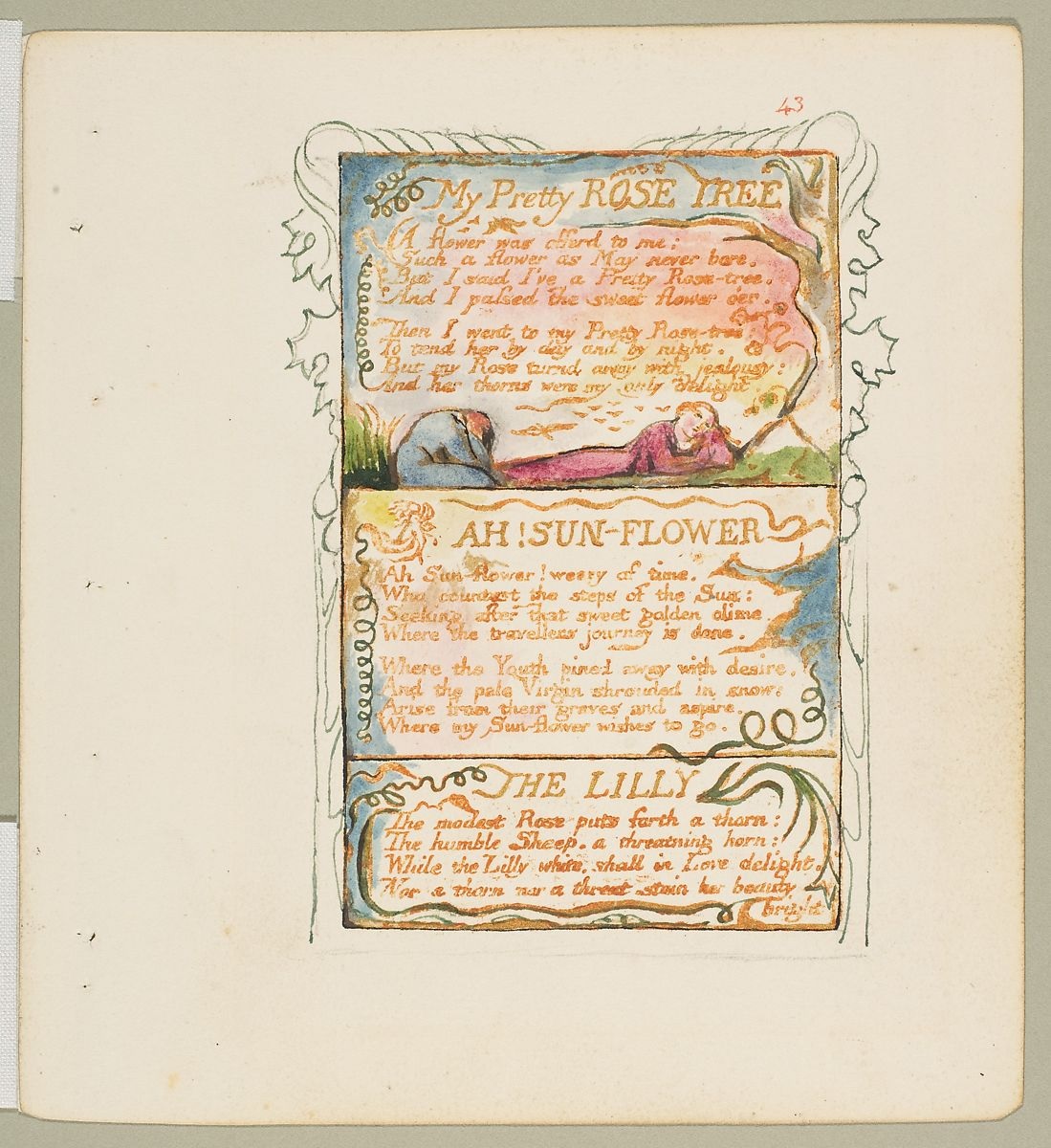
|
- Blake, William. "My Pretty Rose Tree." c. 1825. Songs of Experience.
Plate 43. Metropolitan Museum of Art, New York.
|
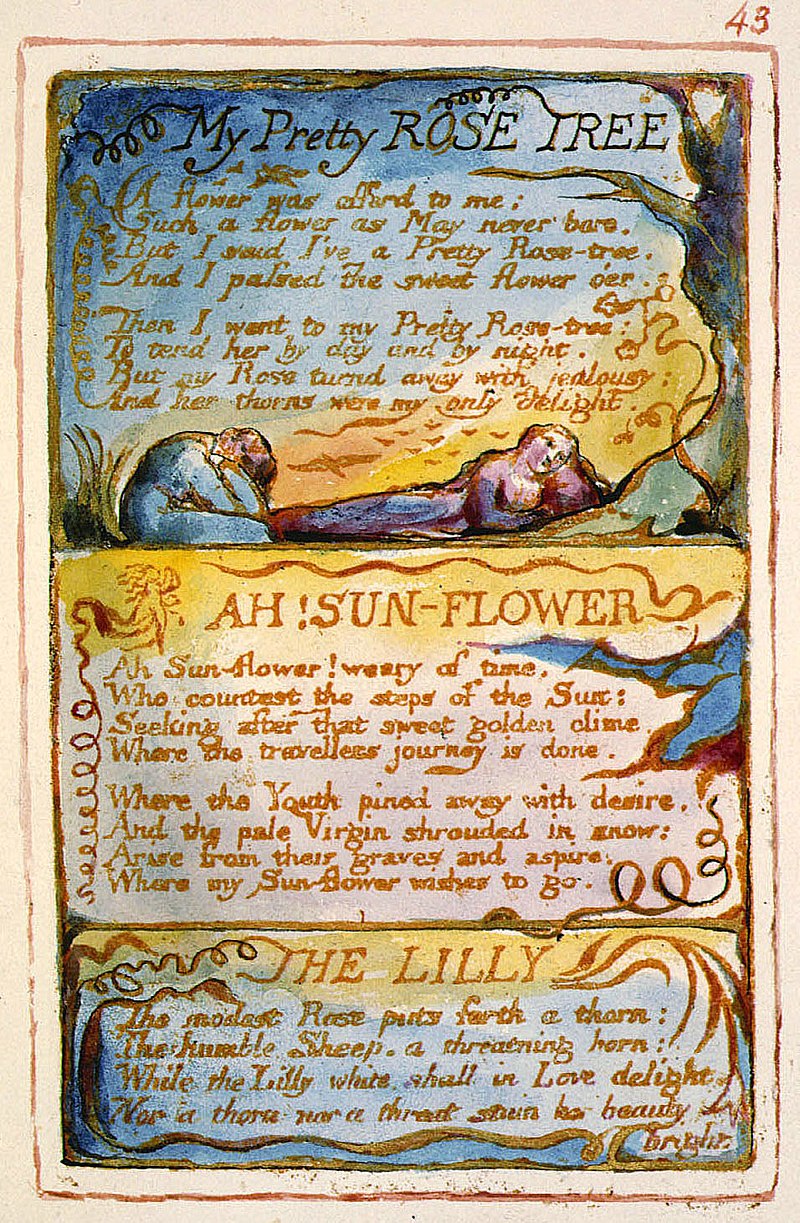
|
- Blake, William. "My Pretty Rose Tree." 1826. Songs
of Innocence and Experience. Object 43. Copy AA.
Fitzwilliam Museum, Cambridge.
|
Media
|
|
- Colin Harrison,
"William Blake: Visionary," Ashmolean Museum
(2015; 2:03 min.)
|
|
- "William Blake's
Printing Process," The British Library (2014; 8:09
min.)
|
|
- Peter Ackroyd, The Romantics,
BBC (2006; video clips)
- Episode 1: Liberty (59:02 min.; Blake,
Coleridge, Wordsworth)
- Episode 2: Nature (58:07 min.; Mary Shelley)
- Episode 3: Eternity (59:00 min.; Byron,
Keats, Shelley)
|
|
- "William Blake," Famous Authors,
directed by Malcolm Hossick, Academy Media (2005; 31:22
min.)
|
Reference
Blake, William. The Complete
Poetry and Prose of William Blake. Edited by David V. Erdman,
Anchor, 1988.
Mitchell, W. J. T. Blake's
Composite Art: A Study of the Illuminated Poetry. Princeton UP,
1978.
Further Reading
Keynes, Geoffrey. Drawings of
William Blake: 92 Pencil Studies. Dover, 1970.
Lister, Raymond. The
Paintings of William Blake. Cambridge UP, 1986.
Home | Literary
Terms
Last updated August 17, 2020





